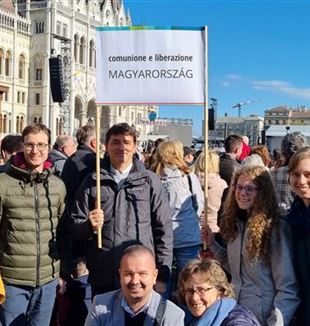
Hungary: “Today I am coming to your house!"
The Fraternity Exercises, the Pope's visit to Budapest, European Responsibles' Diaconia. For the Hungarian community, "This is how God came looking for us."In Hungary, the movement took root in the 1980s. It all started from the friendship between a group of young people from a parish in Budapest and some Italian students and workers. Over time new relationships were born, families expanded, new generations followed, cultural events and initiatives, charity and mission. Today there are about forty adults, present in the cities of Budapest and Mosonmagyaróvár. The numerous children have given rise to small groups of GS and CLU. Also accompanying the life of the Hungarian community are three priests from the St. Charles Fraternity, who have been entrusted a large parish in the capital.
Recently, the Lord has given us the gift of being able to host, despite our small community and our incomprehensible language, three international events. In April, the Fraternity Exercises were held in Esztergom, a city that is the seat of the Hungarian Archdiocese. As happens every year, this gesture gathers about 120 people from the Czech Republic, Slovakia and Austria. Furthermore, at the end of April, Pope Francis chose Budapest as the destination of his apostolic journey: many of us were able to follow him to the numerous meetings he had (he met with young people, refugees, consecrated people and the university world) and we participated together in the concluding Mass in Parliament Square. Finally, at the beginning of May, Esztergom hosted the Diaconia of the European leaders of Communion and Liberation, and at the end of this, Davide Prosperi was also able to meet the Hungarian community for the first time.
The most evident experience after these exceptional events was that God came to visit us in our home, like when Christ said to Zacchaeus, "Today I am coming to your house!" We were at home in Hungary, committed to our lives, and the Church reached out to us first through friends in neighboring communities, then with the coming of the Holy Father, and finally with the occasion of the European Diaconia. It reached out to embrace us and this provoked us to a response, that is, to a responsibility.
This is precisely what Krisztina, a dentist and mother of three children, who lives in an area of Budapest where the Pope passed several times, testifies: "I had the impression that the Holy Father had come to Budapest just to see the places I frequent, the streets I pass through, my whole daily reality. Thanks to his person and presence, I realized how important I am to God, and he confirmed my understanding that I am in the right place."
She is echoed by our friend Balázs, a lawyer who is married with four children: "I see that the familiarity experienced with those I have met, perhaps for the first time, in these exceptional weeks is the same I experience with the people who are always with me, to whom I belong, through whom I belong to Christ. Now, in order to be permeated by what we have heard and experience, I need silence and my friends."
Edina, a friend of the first generation of CL in Hungary, also testifies to this. In addition to being a wife, mother, grandmother and worker, she accepted the commitment to organize the events in Esztergom. This is how she experienced those days: "These were days preceded and accompanied by much work and worry. Yet within the avalanche of events and people, I relived the amazement of the first encounter: 'Christ is here.' It was most evident that I am part of this community where I can meet Him and that it is part of me: 'I am You who make me.'" When it was all over, "suddenly there was silence. Not an empty silence, but a help not to forget what has happened. So we take seriously the words of Pope Francis: 'founded on solid roots, we are going out'."
The assembly with Davide Prosperi concluded this intense period, putting us back on our path. Many themes were shared unreservedly: the use of time, mission, the risk of activism, cultural differences with the people we meet, the daily challenge of young families... Davide did not give a ready-made answer to these questions but helped us to understand "that everything that is asked of us begins with what is given to us" and that, in our endeavors, "the criterion is not how much we spread the movement in Hungary but how much our faith grows." With gratitude, we continue our journey!
Ágnes, Frances and the Hungarian communities